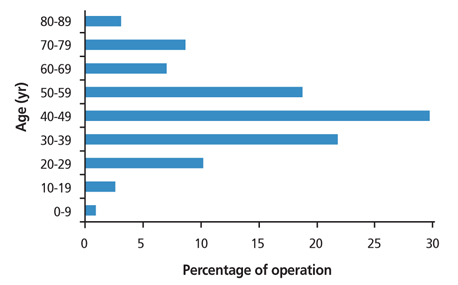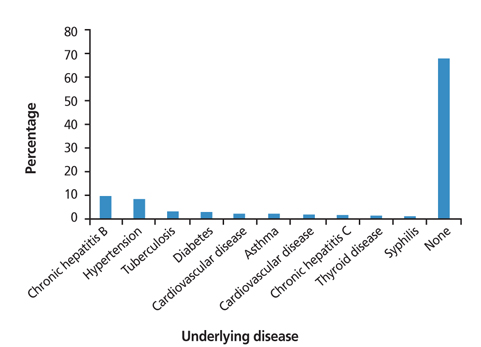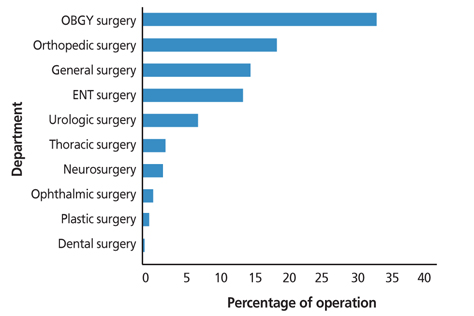J Korean Med Assoc.
2015 Dec;58(12):1190-1195. 10.5124/jkma.2015.58.12.1190.
Trends of surgical operations of North Korean defectors at a single hospital
- Affiliations
-
- 1National Medical Center, Seoul, Korea. kimje78@gmail.com
- KMID: 2195148
- DOI: http://doi.org/10.5124/jkma.2015.58.12.1190
Abstract
- The health and welfare of North Korean defectors is a rising interest as a large number of North Korean defectors are currently living in South Korea. Due to shortage of food provisions, intensive physical labor oriented lifestyle and inadequate medical service system, the medical environment and disease distribution is very different between North and South Korea. Furthermore the physical and mental hardships during the escape from North Korea and the difficulty of adjusting to a new society may all contribute to the health status of North Korean defectors. Recently many health concerns of North Korean defectors have been a social issue in the Korean society. There have been studies and statistics on the mental illnesses of the defectors due to the sufferings during the escape and the difficulty in adjusting into a new environment but there have been no information on the surgical aspects of the defectors. Analyzing the underlying diseases and the incidences of surgery may prepare for an improved understanding in patient care of North Korean defectors
Figure
Reference
-
1. Ministry of Unification. Data policy towards North Korean defectors. Sejong: Ministry of Unification;2014.2. Jeon JH, Park Y. The Effects of individual characteristics and health beliefs on North Korean refugees' health behavior. J Korean Acad Community Health Nurs. 2012; 23:82–90.
Article3. Korean Society for the Study of Obesity. Diagnosis of obesity. Seoul: Korean Society for the Study of Obesity;2012.4. Size Korea [Internet]. Eumseong: Korean Agency for Technology and Standards;cited 2015 Dec 9. Available from: http://sizekorea.kats.go.kr.5. Hwang N. South and North Korean levels of health gap. KiHSA Health Welf Issue Focus. 2012; 03. 23. [Epub] https://www.kihasa.re.kr/html/jsp/publication/periodical/focus/list.jsp?key=title&myear_value=2012&query=%B3%B2%BA%CF%C7%D1+%B0%C7%B0%AD%BC%F6%C1%D8+%B0%DD%C2%F7.6. Korea Centers for Disease Control and Prevention. National health statistics. Cheongju: Korea Centers for Disease Control and Prevention;2010.7. Korea Centers for Disease Control and Prevention. Hepatitis C danger area and measuring prevalence rate of infection route survey. Cheongju: Korea Centers for Disease Control and Prevention;2013.8. Korea Centers for Disease Control and Prevention. TB pa-tients reporting annual status report. Cheongju: Korea Centers for Disease Control and Prevention;2013.9. National Health Insurance Service. Statistical yearbook of major surgery. Seoul: National Health Insurance Service;2013.10. Kim JS. Pharmaceutical policy and health care research in DPRK [dissertation]. Seoul: University of North Korean Stu-dies;2012.11. Ann SY. Analysis of clinical characteristics of defectors from North Korea visited to tertiary hospital. Seoul: Dankook University;2014.12. Kim D. Response of medical care in a crisis situation of North Korea for unification. Suwon: Kyonggi University;2012.13. Nolte E, Scholz R, Shkolnikov V, McKee M. The contribution of medical care to changing life expectancy in Germany and Poland. Soc Sci Med. 2002; 55:1905–1921.
Article14. Heinemann L, Dinkel R, Gortler E. Life expectancy in Ger-many: possible reasons for the increasing gap between East and West Germany. Rev Environ Health. 1996; 11:15–26.
Article
- Full Text Links
- Actions
-
Cited
- CITED
-
- Close
- Share
- Similar articles
-
- The Ego Defense Mechanism of North Korean Defectors in South Korea
- Issues and problems of adaptation of North Korean defectors to South Korean society: an in-depth interview study with 32 defectors
- Stigma of Mental Illnesses as Perceived by North Korean Defectors Living in South Korea
- Seroprevalence of Hepatitis C Virus Infection in North Korean Defectors Residing in Korea
- North Korean defectors seeking health certification to take the national medical licensing examination in the Republic of Korea: figures and procedures




